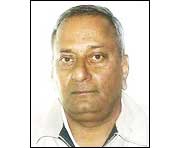
To adopt a Canadian name
 English names taken by ethnic minorities in Canada are not only for the purpose of making one feel more comfortable; it is also with a view to subconsciously lead the white Canadian into thinking an Anglicized name means Western business etiquette is a natural consequence.
English names taken by ethnic minorities in Canada are not only for the purpose of making one feel more comfortable; it is also with a view to subconsciously lead the white Canadian into thinking an Anglicized name means Western business etiquette is a natural consequence.
“Benny” is a popular name in Hong Kong and likewise it is a common name in Richmond, British Columbia, and along Main Street in Vancouver. The prefix and root comes from the Middle English word “bene” which can mean prayer or boon. The choice is understandable since the original name of the bearer might have sounded foreign; however, if the adopted name turns out to be Benny Yap it can even be used in style.
“The name’s Yap…Benny Yap!”
However, not all ethnic minorities enjoy such James Bond like associations: Sometimes, Indian names may merit amendment when they come under sarcastic reference. Dikshit and Hardik when pronounced by North American native speakers can strike one as positively weird. The former is a surname that the letter “x” is used to replace “ksh” (though of little avail) and the latter need never consult a doctor. The saving grace is that the “dik” can be replaced with Richard.
Some names can incorporate a creepy double whammy as in the case of Poopi Brar in which case one might choose a North American pet name like Pop since Poop is not an option.
But a common ethnic Indian name is Dave and little else could be more apt. Dave is the logical short form for Davinder but it is among ethnic females that high-end names like Cherise, Cassandra and Francine are being chosen for second-generation Indo-Canadian girls. Those names match a new generation of second-generation immigrants and their North American peers with matching lifestyles.
Popular Korean names are John, James, Paul and Daniel; whereas, for girls the popular names are Jennifer, Julie, Christine and Grace and Hannah ― the last being conveniently the same in Korean and English.
Second generation Japanese-Canadians talk and think like Caucasian Canadians and somehow English names seem to come to them in a natural course. But they still like to address a friend as Tak ― short for Takuyuki.
Popular English sounding names for Pakistani-Canadians are limited and more likely to be Shams or Mo. Likewise, Iranian-Canadians seem to prefer Tony or Sam. Vietnamese-Canadians choose from a wide variety of names though they seem most comfortable with Wing in which case the name has not been changed.
Filipino-Canadians, however, have little reason to adopt a foreign name simply because their names are more Hispanic and therefore familiar to native speakers in North America.
People who choose to be addressed by their North American English names sometimes find them a boon for the business they are engaged in especially if it is real estate. But every once in a while they confront skepticism.
“But Bill is not your real name…is it?”
Well, in that case the listener now has the option of henceforth addressing the gentleman as Balasubramiam!
The writer is the publisher of Daywatch newspaper in Surrey, British Columbia. He can be reached at daywatchnewspaper@gmail.com. <The Korea Times/Alan Saldanha>


